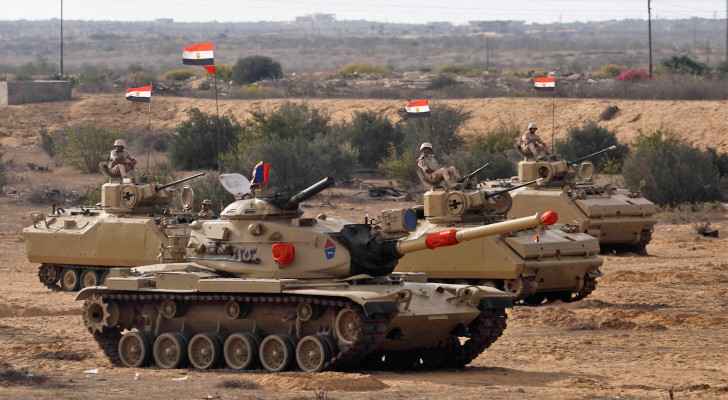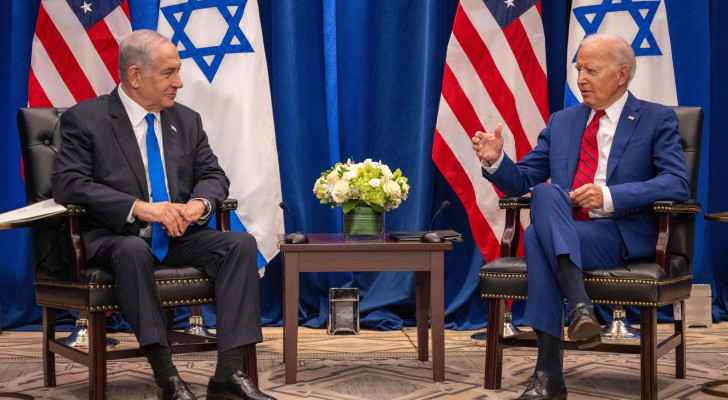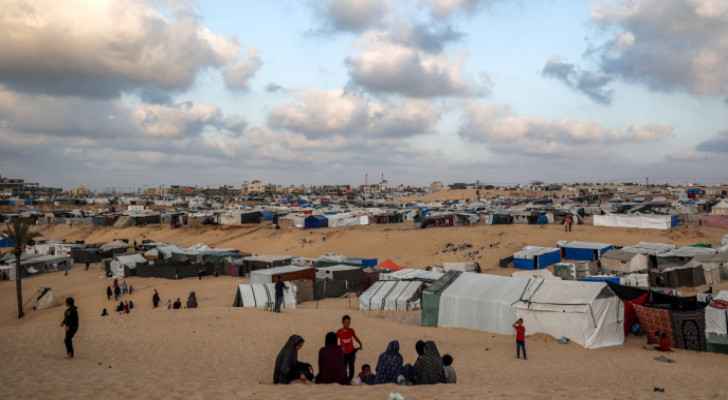Iran’s attack on Israel at the weekend has underlined once more Jordan’s delicate geopolitical position, now acting as a buffer between Tehran and its proxies on the one hand and Tel Aviv on the other. An unknown number of Iranian drones and ballistic missiles crossed Jordan’s night skies — hours after the kingdom closed its airspace to all flights — on their way to Israeli targets. Later, Amman announced that its air force had intercepted “flying projectiles” and shot them down. Officials said Jordan had acted to defend its people and sovereignty, brushing aside Iranian warnings and ultimatums.
Video footage showed such projectiles being intercepted and shot down across Amman’s skies in the early hours of Sunday. Debris of what is believed to be the wreckage of Iranian drones was filmed in the capital’s neighborhoods.
This was not the first time that missiles heading to Israel had flown over Jordan. During the first Gulf War, Saddam Hussein fired Scuds from the eastern Iraqi desert toward Tel Aviv. And since Oct. 7, Jordan has intercepted several drones and missiles fired from Iraq and Yemen against Israeli targets. The Jordanian air force has defended Jordan’s airspace in collaboration with the US and other Western allies, which have previously deployed advanced air defense systems in the kingdom.
Jordanian officials have justified the country’s decision to intercept Iranian missiles. Foreign Minister Ayman Safadi said Jordan must protect its sovereignty and will do so again, regardless of where the rockets come from and where they are heading, even if Israel decides to launch them. But he was careful to point out that it was Israel’s bombing of the Iranian consulate in Damascus earlier this month — an attack that killed seven senior Iranian military officials — that caused the recent escalation.
King Abdullah clearly pointed out that Jordan would not allow a regional war to unfold on its land
Osama Al-Sharif
In a Sunday call with US President Joe Biden, King Abdullah clearly pointed out that Jordan would not allow a regional war to unfold on its land.
Also on Sunday, Jordan’s Foreign Ministry summoned the Iranian ambassador in Amman to protest Iranian media reports, which included a direct warning to Jordan. On Monday, Iran’s Foreign Ministry issued a statement underlining its keenness to maintain good ties with Jordan.
But Jordanian officials were quick to point out that, despite the Iranian reprisal attack, the pressing issue remains Israel’s war on Gaza, the dire humanitarian situation there and the need to end the occupation of Palestinian territories through a two-state solution. For Amman, bringing attention back to the Gaza debacle remains a priority. Jordanian officials hope that US pressure on Israel not to retaliate against Iran will bring an end to this episode and redirect global attention to the war on Gaza.
Safadi told local media that Netanyahu was seeking to ignite a regional war with Iran to deflect attention from the war in Gaza. Such statements appear to ameliorate Jordan’s position both locally and regionally.
By underlining that Amman will not tolerate its airspace being violated by any party, including Israel, it is hoping to absorb local criticism of its interception of Iranian projectiles. The popular mood in the country has been openly hostile toward Israel and the US over the Gaza massacres. Jordanians have taken to the streets in protest for the last six months and emotions have been running high.
In recent weeks, Jordanian officials and pro-government commentators have criticized Hamas’ leadership and the Muslim Brotherhood in Jordan for seeking to incite Jordanians. Some even pointed the finger at Iran for interfering in the country’s domestic affairs. Israeli and Western media outlets have accused Iran of overseeing the smuggling of weapons to the West Bank through Jordan. At least one pro-Iran proxy in Iraq claimed last month that it was ready to arm thousands of Jordanians to fight Israel.
Jordanians have taken to the streets in protest for the last six months and emotions have been running high
Osama Al-Sharif
To be clear, while ties between Jordan and Israel have gone from bad to worse since the latter launched its war on Gaza, coordination at the military and counterterrorism intelligence levels has remained intact. While Jordan has been openly and vehemently critical of the far-right government of Benjamin Netanyahu, even before the Oct. 7 attacks, both sides have been careful not to push ties to the point of no return. Jordan is aware of the need to preserve the peace treaty to protect the kingdom’s national security in light of the deteriorating security situation in the West Bank, and most recently in Gaza and what that could lead to.
Still, the king and senior officials have led regional and international criticism of Israel’s reckless war in Gaza and warned of the impending humanitarian disaster there. Jordan was the first country to conduct food airdrops over northern Gaza, opening the way for other countries to do the same.
The kingdom’s position on Gaza brought about an unprecedented rhetorical attack by extremist Israeli officials. Relations between the two countries had reached a historic low point. But while some in the Israeli media praised Jordan’s role in downing Iranian drones and missiles, officials in Amman made sure to point out that they were acting in Jordan’s best interests and were not doing Israel any favors. Jordan is skeptical of Netanyahu’s prevarications on key issues such as the custodianship of Al-Aqsa Mosque and the two-state solution.
Jordan’s relations with the Islamic Republic have always been strained. Amman stood with Baghdad during the Iran-Iraq War in the 1980s and refused to join a US-led international coalition against Saddam Hussein in the first Gulf War. Still, the two countries have maintained diplomatic ties for most of the past 40 years, as Jordan always realized that turning Tehran into an enemy would not serve its national interests. At one point last year, the two countries’ foreign ministers exchanged calls and met to normalize relations. Amman is yet to send an ambassador to Tehran. Now, such a move will remain on hold.
Jordan, a key US ally, has tried to chart a seemingly independent regional foreign policy despite its growing dependence on Washington. It did so with Syria’s Bashar Assad and with various Iraqi premiers following the US invasion of Iraq.
Jordan has learned to walk a precarious political tightrope with the outer neighborhood. The fast-changing geopolitical terrain, especially under former US President Donald Trump, has forced the kingdom to adapt quickly while still maintaining this delicate balancing act.
With Tel Aviv and Tehran moving from their shadow war toward a more open one, Jordan once again finds itself in an uneasy place. With one eye focused on Gaza and the West Bank, it is also keeping track of a possible regional conflagration. Jordan’s utmost priority is to cushion itself against any harmful fallout from both simmering conflicts. It is not an easy task — it never is — but it is one in which Jordan has an impressive track record.
- Osama Al-Sharif is a journalist and political commentator based in Amman. X: @plato010
Latest News
Most Read Articles
- Queen Rania warns of threat to ‘rules-based world order’ as Israel’s war on Gaza continues
- Hamas delegation to return to Cairo for more ceasefire talks
- Moderate state of emergency declared by Amman Municipality
- United States delays delivery of ammunition shipment to “Israel”
- “Israeli” army says three soldiers killed, 12 wounded in Hamas attack
- JAF conducts 5 more aid airdrops into northern Gaza
- Government to hold Jordan Forum for Media and Digital Communication
- Gaza death toll rises to 34,683
- Israel Attacks Rafah After Hamas Claims Responsibility for Deadly Rocket Attack
- Israeli Occupation army calls for evacuation in Gaza's Rafah ahead of invasion




